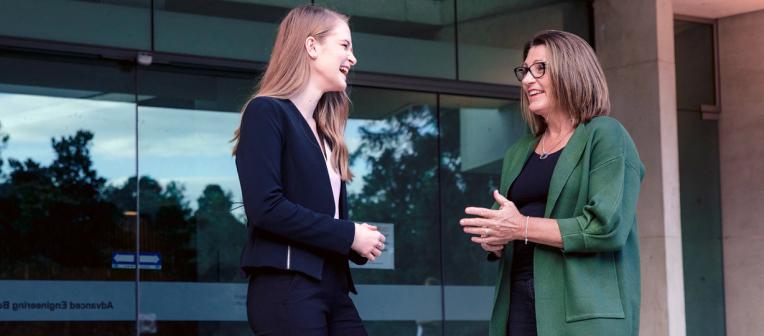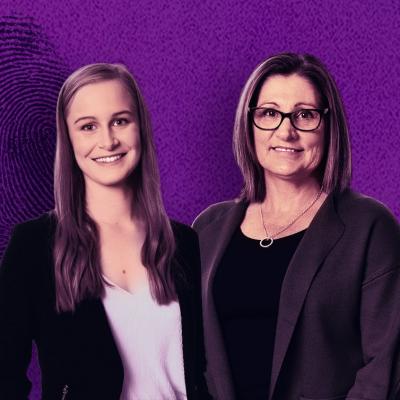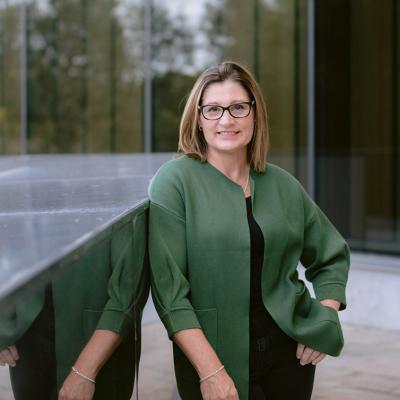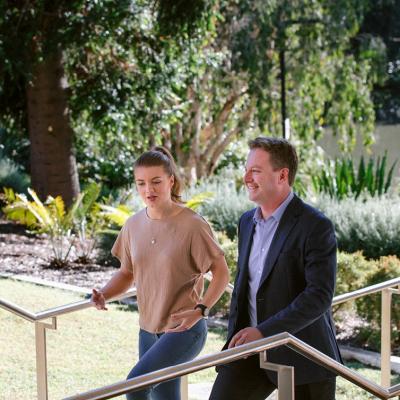Considering studying criminology at university? You may have lots of questions. We're here to help you find answers.
- What do you study in criminology?
- What can you do with a criminology degree?
- Is criminology a good degree?
- How long does a criminology degree take?
- Is a criminology degree worth it?
We've interviewed a UQ student and academic to find out. Beck is a criminology and criminal justice student and Professor Lorraine Mazerolle is a course coordinator in the Bachelor of Criminology and Criminal Justice program. They’ve teamed up to answer some of your questions and uncover how UQ can give you the skills you need to face the future, even when you don't know exactly what the future will look like.
Let's find out if criminology and criminal justice sounds like the study area for you.
Since this article's original publish date in July 2020, Beck has graduated and secured employment as a cyber security consultant, where she works closely with a diverse range of clients to assess their cyber security posture and elevate their security controls.
What is it about UQ's approach that makes us the most employable graduates in the state?
Lorraine: The Bachelor of Criminology and Criminal Justice at UQ is unique in the world, we have three years of criminal law, and four years of professional practice built into our program, if you choose study the additional honours year.
What's been the most unexpected thing you've been happy to discover at UQ?
Rebecca: I think the best thing that I've noticed is that the lecturers are so willing to help and they are so friendly and so warm. They're really friendly and willing to help and really approachable, and as a high school student I didn't expect that.
If you're employing the next criminology and criminal justice graduate, what would you be looking for?
Lorraine: Ours is a three-year program, and we have the option of an additional honours year - which absolutely makes a difference to employers. They want that fourth year, it makes our students completely stand apart to those with a three-year degree.
What does a day in the life of a criminology and criminal justice student look like?
Rebecca: Well, you might start with a seminar in the morning, a lecture or a tute, you might go to lunch with your friends at places like Darwin's or Wordsmith's, you might take a walk around the beautiful lakes. I know friends that go to the gym, might go to the pool.
Lorraine: How do you get here?
Rebecca: You can catch the ferry, you can catch the buses, super easy there's two bus stops, or you can drive as well.
How do you prepare students for the future when we don't know what the future looks like?
Lorraine: In criminology, crimes are changing all the time, so our students really have to be able to pivot, they have to be flexible, they have to really be able to look at new and growing opportunities for where we can prevent and control crime. So we really need that flexibility in thinking, and then being able to really switch and change gears to address new problems.
What are the most valuable skills you've learnt as part of your degree?
Rebecca: Learning to critically analyse and writing really well and working with industry as well. We've had to know how to write briefs for them, to update them on what we're doing. At the moment I'm working with the Australian Centre to Counter Child Exploitation and I'm doing research alongside them. Updating them on how the project’s going and where my research is heading has been really important.
What opportunities do students have to get hands-on experience in our industry?
Lorraine: We bring the industry into the classroom. In your fourth year, should you choose to do it, you actually are embedded into an industry to do your honours thesis and your honours project, and having that experience is just fantastic because you really get to work with the industry and you get to see what it's like to be a worker in the criminal justice industry.
How does the way you learn at UQ teach you the skills you need to face an unknown future?
Rebecca: I think working with industry and having industry members come into our classrooms a lot has been really helpful, and then knowing how to deal with unknown situations, especially in things like online crime, that's constantly evolving and changing.

What are some of the coolest jobs your former students are doing?
Lorraine: Well, I think all jobs in criminology are the coolest in the world, I can't imagine anyone not wanting to be a criminologist, but we have students who are intelligence officers working for the police. We have one of our students working for the Hate Crime Review Board. We have students that are working as case managers in a range of different industries, so they're really cool jobs they're working in, they're making a difference. Changing our world.
What's the most interesting thing you've learnt that's not part of your coursework?
Rebecca: I think learning to think innovatively, and work on problem-solving. Those are all really key things that we've learned that weren't necessarily part of our curriculum, but it's something that we had to implement in a lot of the things that we did.
What makes a good student, and are they the same things that make a good job candidate?
Lorraine: When we built the program, we went to industry, and we said to our industry partners, what graduate attributes do you need? And they told us really clearly they need good writers, they need people with strong analytic skills.
So we've built that through the whole program and I think that our students have really good strong elementary skills, they've got excellent writing skills, they know how to write for different audiences like industry, and they know how to talk to industry because they're embedded with industry, right from day one, semester one, at UQ.
What have you learnt about yourself since you began your studies at UQ?
Rebecca: I've learned about my strong leadership skills, and my skills in ethics and working with criminal justice agencies. That's really, really important.
If you could give me one piece of advice that would set me apart as a job candidate, what would it be?
Lorraine: I do think that confidence is a really important, I always talk about the X factor with our students having their four-year honours, having an embedded industry experience is really showing that you are a confident young professional, that's what's really going to set you apart.
Explore the Bachelor of Criminology and Criminal Justice or discover what it's really like to study other programs at UQ.






